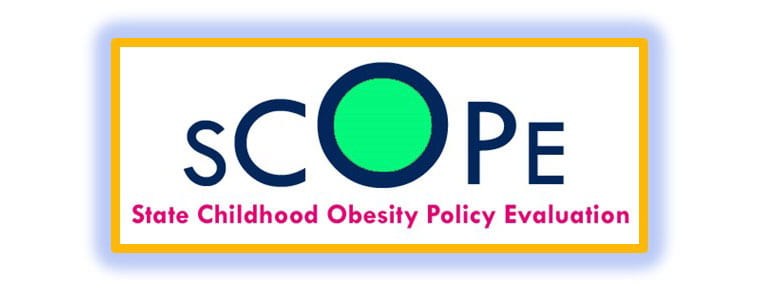State Childhood Obesity Policy Evaluation (SCOPE): 2012-2014

Project Dates: 2012-2014
The SCOPE project compares legislative databases for comprehensiveness and usability; researches state childhood obesity legislation and the predictors of enactment; and interviews state legislators to determine barriers and facilitators of introducing and enacting legislation relevant to childhood obesity.
Childhood obesity in the United States has reached epidemic proportions. In response, there has been a focus on identifying effective interventions and prevention strategies to reverse the childhood obesity epidemic by 2015. In recent years, many states have introduced and enacted legislation that focuses on obesity prevention in youth in schools and community settings. Identifying and evaluating these policies is an important facet of obesity research. SCOPE is a two year rese Childhood obesity in the United States has reached epidemic proportions. In response, there has been a focus on identifying effective interventions and prevention strategies to reverse the childhood obesity epidemic by 2015. In recent years, many arch project funded by the Robert Wood Johnson Foundation that continues the work of the Childhood Obesity Policy Study (COPS) completed in 2005 at the PRC. The SCOPE research team will identify state legislation from 2006 to 2009 that addresses obesogenic environments, look for factors that increase enactment of such legislation and interview state legislators about the factors that facilitate and inhibit passing such legislation.
The SCOPE study consists of two phases. First, states were grouped into one of four categories based on state childhood obesity levels (from the 2007 National Survey of Child Health), and the number of enacted obesity prevention bills. States were categorized in quadrants by high-low legislation and high-low obesity levels. States in each quadrant were selected for the qualitative phase of the SCOPE study. Within these states, legislators will be interviewed to identify differences and similarities among states in the four quadrants in relation to childhood obesity prevention. In the second phase of the study the SCOPE team will study factors that are related to increased rates of policy enactment, and identify components of the legislation that are evidence-based. A hierarchical model will be created to analyze state, legislator, gubernatorial, and bill-level factors that could impact enactment of legislation. Additionally the SCOPE team will compare the usability and comprehensiveness of online policy databases. Briefs, articles, and presentations will be produced and disseminated from of each part of the study. The categories of bills collected for analysis include:
Community Based Legislative Interventions:
- Breastfeeding
- Public Transit
- Complete Streets
- Trails and Paths (biking and walking)
- Pedestrian Safety
- Parks and Green Spaces
- Sports and Physical Fitness
- Farmers Markets
- Food Deserts
- Product Labeling
- Menu Labeling
- Snack Taxes
- Soda Taxes
- Childcare Centers
- Nutrition
- Physical Activity
School Based Legislative Interventions:
- Farm to School Programs
- School Nutrition
- Breakfast Programs
- Vending Machines
- Nutrition Guidelines
- BMI Testing/Recording
- Health Education
- Physical Education
- Outdoor/Environmental Education
- Obesity Taskforces/Studies
- Safe Routes to School
- Local Authority
- Screen Time
- Model School Policies
Project Goals
- Develop a descriptive content review for state policies relating to childhood obesity.
- Describe the predictors of enactment of legislation on childhood obesity prevention.
- Compare the patterns and quality (e.g., extent of coverage, inclusion of evidence-based features) of legislation in states with high and low levels of childhood obesity prevalence.
- Summarize the process of state legislative analysis in a template for other researchers.
Implications for Research and Practice
State legislation is a powerful tool in changing environments. Legislation can improve accessibility to physical activity opportunities or ensure that school lunches are nutritious. Studying the course of state childhood obesity prevention legislation allows policy advocates, obesity prevention professionals, legislators, and researchers to pinpoint gaps in policy. It can also identify states that should be targeted for advocacy work. Legislation can provide positive changes to the environment to help prevent childhood obesity.
Project Contact
Amy Eyler: aeyler@wustl.edu
Project Staff
Principal Investigator: Amy Eyler, PhD CHES
Investigator: Ross Brownson, PhD
Project Manager: Leah Nguyen, MSW
Research Assistant: Jooyoung Kong, MSW
Project Partners
Ellen Jones, MS, PhD Candidate, University of Mississippi Medical Center
Funding Source
Robert Wood Johnson Foundation
Related Resources
Nguyen, L; Eyler, AA; Kong, J; Brownson, RC. State Legislation Savvy: A Primer and Tools for Online Legislative Research in the United States. CDC- Preventing Chronic Disease: Volume 9, 2012.
Jones, E; Eyler, AA; Nguyen, L; Kong, J; Brownson, RC; Bailey, JH. It’s All in the Lens: Differences in Views on Obesity Prevention between Advocates and Policy Makers. Childhood Obesity. 2012 June; 8(3). DOI: 10.1089/chi.2011.0038.
Eyler, AA; Nguyen, L; Kong, J; Yan, Y; Brownson, RC. Patterns and predictors of enactment of state childhood obesity legislation in the United States: 2006-2009. Am J Public Health. 2012 Dec;102(12):2294-302. DOI: 10.2105/AJPH.2012.300763.
Researching State Legislation. Leah Nguyen, MSW; Jooyoung Kong, MSW; Amy A. Eyler, PhD, CHES. Brown School of Social Work Professional Development Series, January 29, 2010, St. Louis, Missouri
Why do States Differ in the Level of Childhood Obesity Legislation? Ellen Jones, PhD. Active Living Research 7th Annual Conference, February 10, 2010, San Diego, California.
Policy Influences on Obesity: Challenges and Opportunities. Amy A. Eyler, PhD, CHES. University of Kansas 11th Annual Conference on the Prevention and Treatment of Overweight and Obese Individuals, September 2009, Riverside, Kansas.
State Legislative Search Guide
A tool with links, contact information, years covered and searching tips and website characteristics for all 50 states’ free legislative databases to facilitate cost effective research of state legislation in an easy to read table.
Condensed State Legislative Search Guide
A two page quick reference with database links, contact information and years covered for all 50 states’ free legislative databases.
Policy Maker Interview Guide
An interview guide oriented toward policy makers regarding the facilitators and barriers to state obesity policy.
Advocate Interview Guide
An interview guide oriented toward state childhood obesity advocates regarding the facilitators and barriers to policies.